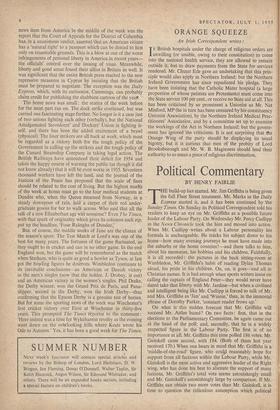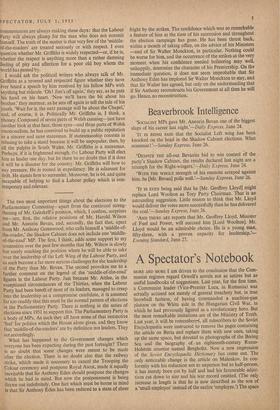Political Commentary
BY HENRY FAIRLIE THE build-up has started. Mr. Jim Griffiths is being given the full Fleet Street treatment. Mr. Marks in the Daily Express started it, and it has been continued by the Sunday Times. On Sunday its Political Correspondent told his readers to keep an eye on Mr. Griffiths as a possible future leader of the Labour Party. On Wednesday Mr. Percy Cudlipp in the News Chronicle took the hint and moved into action. When Mr. Cudlipp 'writes about a Labour personality his formula is unchangeable. He tracks his subject down to his home—how many evening journeys he must have made into the suburbs or the home counties ! —and there talks to him, about his memories, his hobbies and his children. Faithfully, it is all recorded : the pictures in the back sitting-room at Wimbledon, Mr. Griffiths's habit of reading Dylan Thomas aloud, his pride in his children. On, on, it goes—and all in 'Christian names. It is bad enough when sports writers insist on calling the captain of England Peter—they would never have dared take that liberty with Mr. Jardine—but when a civilised and intelligent being like Mr. Cudlipp is forced to talk of. Mr. and Mrs. Griffiths as 'Jim' and Winnie,' then, in the immortal phrase of Dorothy Parker, 'constant reader frows up.'
On what is this sudden forecast that Mr. Griffiths will succeed Mr. Attlee based? On two facts : first, that in the elections to the Parliamentary Committee, he again came out at the head of the poll; and, secondly, that he is a widely respected figure in the Labour Party. The first is of no importance at all. Mr. Griffiths this time polled 186 votes. Mr. Gaitskell came second, with 184. (Both of them last year received 170.) When one bears in mind that Mr. Griffiths is a `middle-of-the-road' figure, who coulil reasonably hope for support from all factions within the Labour Party, while Mr. Gaitskell is the most active and aggressive leader of the Right wing, who has done his best to alienate the support of many factions, Mr. Griffiths's total vote seems astonishingly small and Mr. Gaitskell's astonishingly large by comparison. If Mr. Griffiths can obtain two more votes than Mr. Gaitskell, it is time to question the ridiculous assumption which political commentators are always making these days: that the Labour Party will always plump for the man who does not commit himself. The truth of the matter is that very few of the 'middle- of-the-roaders' are treated seriously or with respect. I even question whether Mr. Griffiths is widely respected—or, if he is, whether the respect is anything more than a rather damning feeling of pity and affection for a poor old boy whom the world has passed by.
I would ask the political writers who always talk of Mr. Griffiths as a revered and respected figure whether they have ever heard a speech by him received by his fellow MPs with anything but ridicule. 'Oh ! Jim's off again,' they say, as he puts his hand on his heart. 'Now we'll have the bit about his brother,' they murmur, as he sets off again to tell the tale of his Youth. 'Wait for it, the next passage will be about the Chapel,' and, of course, it is. Politically Mr. Griffiths is, I think, a phoney. Composed of seven parts of Welsh cunning—just have another look at that face, those eyes—and three parts of Welsh emotionalism, he has contrived to build up a public reputation as a sincere and sane statesman. If statesmanship consists in refusing to take a stand because it will be unpopular, then, by all the pulpits in South Wales, Mr. Griffiths is a statesman. Perhaps, if it is frightened enough, the Labour Party will elect him as leader one day, but let there be no doubt that if it does it will be a disaster for the country. Mr. Griffiths will bow to any pressure. He is rooted in expediency. He is adamant for drift. He stands firm to surrender. Moreover, he is 64, and quite incapable of helping to find a Labour policy which is con- temporary and relevant.
The two most important things about the elections to the Parliamentary Committee—apart from the continued streng- thening of Mr. Gaitskell's position, which, I confess, surprises me—are, first, the relative positions of Mr. Harold Wilson and Mr. Aneurin Bevan, and, secondly, the fact that, apart from Mr. Anthony Greenwood, who calls himself a 'middle-of- the-roader,' the Shadow Cabinet does not include one 'middle- of-the-road' MP. The first, I think, adds some support to my contention over the past few months that Mr. Wilson is slowly but surely reaching the position where he will be able to take over the leadership of the Left Wing of the Labour Party, and as such become a far more serious challenger for the leadership of the Party than Mr. Bevan. The second provokes me to a further comment on the legend of the 'middle-of:the-road' figures in the Labour Party. Just because Mr. Attlee, in the exceptional circumstances of the Thirties, when the Labour Party had been bereft of most of its leaders, managed to creep into the leadership as a compromise candidate, it is assumed far too readily that this must be the normal pattern of elections in the Parliamentary Party. There is nothing in the series of elections since 1951 to support this. The Parliamentary Party is a body of MPs. As such they all have some of that instinctive `feel' for politics which the House alone gives, and they know that 'middle-of-the-roaders' are by definition not leaders. They act accordingly. What has happened to the Government changes which everyone has been expecting during the past fortnight? There is no doubt that some changes were meant to be made after the election. There is no doubt also that the railway strike, which made it necessary to cancel the Trooping the Colour ceremony and postpone Royal Ascot, made it equally inevitable that Sir Anthony Eden should postpone the changes which he had in mind. But now the postponement is being drawn out indefinitely. One fact which must be borne in mind is that Sir Anthony Eden has been reduced to a state of sheer fright by the strikes. The confidence which was so remarkable a feature of him at the time of his succession and throughout the election campaign has gone. He has been thrust back, within a month of taking office, on the advice of his Ministers —and of Sir Walter Monckton, in particular. Nothing could be worse for him, and the occurrence of the strikes at the very moment when his confidence needed bolstering may well. unhappily, determine the character of his Premiership. On the immediate question, it does not seem improbable that Sir Anthony Eden has implored Sir Walter Monckton to stay, and that Sir Walter has agreed, but only on the understanding that if Sir Anthony reconstructs his Government at all then he will go. Hence, no reconstruction.















































 Previous page
Previous page